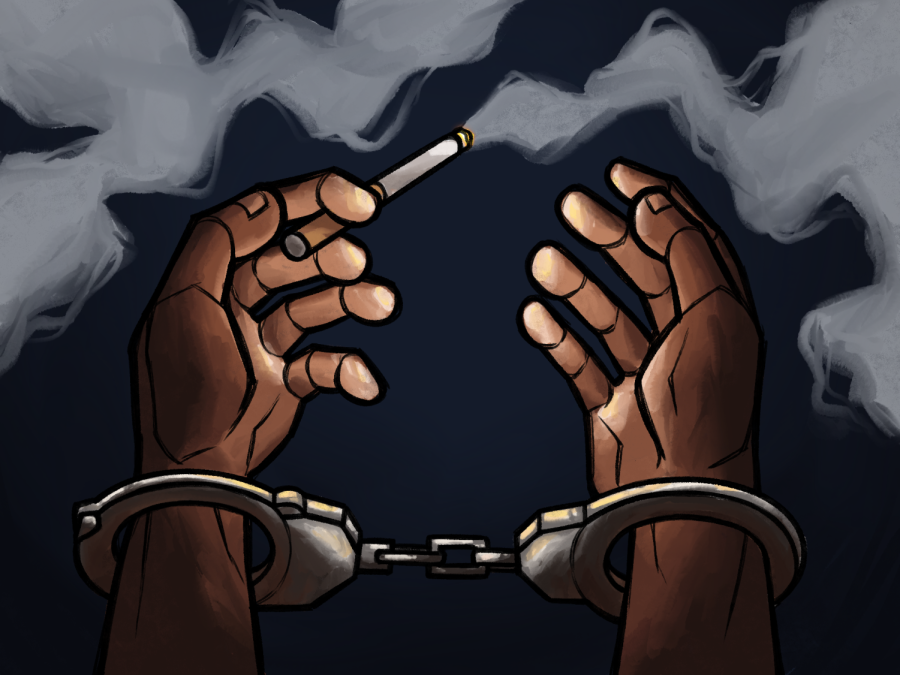OPINION: The Drug War reveals corrupt roots in the American prison system
The American Drug War has criminalized Black people and has contributed to increasing incarceration rates.
In 1971, President Richard Nixon issued a statement to Congress at a press conference on drug abuse prevention and control, declaring drugs as a public enemy. Following the statement, news flooded the media on the newly-declared War on Drugs. The aim of the war was to end illegal drug trading in America and the consumption of psychoactive drugs. Since its declaration, the U.S. has spent a total of $1 trillion on drug control, but it is widely regarded as a failed and prejudiced attempt in reducing the ongoing drug problem in America.
The Drug War’s main purpose was to criminalize Black people. According to Encyclopedia Britannica, 80% of crack users were African American, and obligatory prison minimums for the use of certain drugs have led to a disproportionate increase of imprisonment rates for nonviolent drug perpetrators who are Black. Due to American drug laws, incarceration rates for African Americans have increased. Most notable was the Anti-Drug Abuse Act of 1986, establishing compulsory sentencing schemes and a ratio of 100-to-1 for the sentencing times between crack and powder cocaine sentences.
By 1988, the definition of conspiracy was broadened significantly, and people committing nonviolent and low level drug offenses were being arrested. The laws concerning drugs seemed to operate through a black and white lens, with no regard for how Black people were using and obtaining drugs. The government has failed to locate the main source of the drug issue, and, rather, seems intent on arresting their way out of America’s drug problem.
The reason Black people are more prone to becoming drug users lies in systemic racism that is deeply rooted all over the U.S. According to the National Library of Medicine, systemic racism causes Black people to be more susceptible to living in poverty, thus relying on drugs to cope with stressful life events. The government has trapped Black people in a cycle where they are subjected to racism, driven to take drugs to cope, jailed for taking those drugs and released back into the world to suffer more and become subjected to racism again.
The American legal system discriminates against Black people. According to a ruling made by the Supreme Court in the Harmelin v. Michigan case (1991), first-time drug offenders could incur a lifetime sentence, though the offense is considered neither cruel nor unusual. According to the Eighth Amendment, people should not be subjected to excessive fines nor a cruel or unusual punishment. However, there is no strict requirement for the proportionality between a crime and a sentence.
According to The Gateway Foundation, by 1995, disregard for sentencing times led to roughly one in three African-American men being either on parole, on probation or incarcerated due to the severe effects of the case. Racism has been thoroughly indoctrinated in American law for hundreds of years, with loopholes concerning discrimination and bigotry. The American government does not wish to solve the drug problem in America, rather, they wish to cause more pain within society and continue discriminating against minorities.
The government is failing to solve the ongoing drug problem in America. According to the Leadership Conference Educational Fund, since 1980, the number of incarcerated people due to drug related crimes has skyrocketed 1100%, increasing from 40,000 to 500,000 people. According to the United States Sentencing Commission, over 76.9% of U.S. prisoners incarcerated due to drug-related crimes returned to commit the same crimes within five years upon release, and 49.9% of drug traffickers were released within that same time period.
The goals of the American prison system are twisted and corrupt. Instead of preventing drug-related crimes, the U.S. government has decided to imprison drug users and put them through more suffering. While the incarceration system is advertised as a way to rehabilitate drug abusers, the U.S. makes criminals more prone to leaving the facility and becoming repeat offenders. The system purposefully releases drug traffickers, who are responsible for dispersing illegal substances, causing former eager addicts to drugs once more.
The Drug War was created to push an anti-left political agenda, an opposition against people with more liberal and egalitarian political views. According to former Nixon domestic policy chief, John Ehrlichma, the Nixon administration purposefully started the anti-drug campaign to villainize people who were against American soldiers fighting in the Vietnam War. Ehrilchma admitted to falsifying drug charges in order to arrest leaders of anti-war campaigns.
With roughly 500,000 American casualties, many U.S. citizens had taken anti-war stances and with Nixon’s pro-war campaign and reputation at stake, the Drug War was created to silence the voices of the anti-war left. The government broke into numerous homes to falsely charge innocent people with drug use. By associating the left with drugs and then labeling drugs as criminal, the government knew they could manipulate the public into turning against them. Innocent individuals were being portrayed in the media as drug addicts for the purpose of denouncing their campaign for peace.
The current effort to put an end to drug abuse has proven to be ineffective as drug abuse continues to be an ongoing problem. Instituting mental health centers and giving people more opportunities to receive rehabilitation serves as better alternatives. The Drug Market Intervention Program, an anti-drug campaign, attempts to directly engage the entire community of drug dealers and their families. It promotes a multitude of community services such as drug treatments and improving the relationships between civilians and the police force. Jurisdictions implementing this program have found success in decreasing drug market activity in neighborhoods and lowering reported drug crimes. Despite the failed 50-year-long Drug War, drug use is a problem that can be solved as long as the American people learn to work together to help one another.


